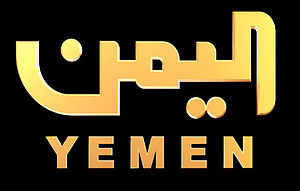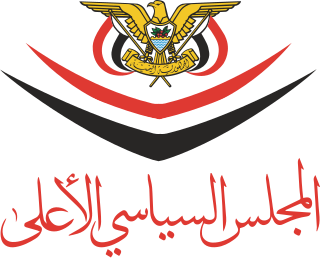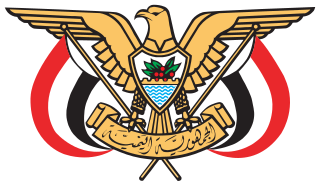Related Research Articles
JeemTV, formerly known is a Qatari Arabic-language pay television channel, aimed at children between the ages of 6 and 12. It was previously co-owned by Al Jazeera Media Network and the Qatar Foundation from launch until June 2013, when Al Jazeera fully acquired the channel. It was then acquired by beIN Media Group on April 1, 2016.
Television in Syria was formed in 1960, with the establishment of Channel 1 when Syria and Egypt were part of the United Arab Republic. It broadcast in black and white until 1976. In 1985 a second channel was established and in 1995 Syrian television rented a channel on Arabsat and it started broadcasting eight hours daily via satellite in 1996. Syrian channels are mostly owned and controlled by the Syrian General Organization of Radio and TV (ORTAS) which is connected to the Ministry of Information. It has 4,800 staff; both government employees and freelancers.

The Houthi movement, officially the Ansar Allah, is a Zaydi Shia Islamist political and military organization that emerged from Yemen in the 1990s. It is predominantly made up of Zaydi Shias, with their namesake leadership being drawn largely from the Houthi tribe. The group has been a central player in Yemen's civil war, drawing widespread international condemnation for its human rights abuses, including targeting civilians and using child soldiers. The movement is designated as a terrorist organization by some countries.
Broadcasting began in Yemen in the 1940s when it was still divided into South and North Yemen, with the South being ruled by the British and the North being ruled by the Kingdom of Yemen. After the unity of Yemen in 1990, Yemeni government reformed its corporations and founded some additional radio channels which can broadcast locally. However, it drew back after 1994 due to destroyed infrastructures by the civil war. In 1995 it commenced its first TV broadcasting abroad and since then there has been some gradual increase in its radio and television channels most of which belong to the government.
Radio Dabanga (part of Dabanga – Radio TV Online is a radio and online news service that serves Sudan. The shortwave radio has been broadcasting since 1 December 2008. Current broadcasts last for a total of two hours each day. Radio Dabanga introduced an online radio feed in April 2023, broadcasting twenty-four hours a day. Dabanga also publishes its content on Satellite TV, Facebook, WhatsApp, YouTube, and SoundCloud. Depending on the medium, Radio Dabanga produces news in Sudanese Arabic and/or English. Shortwave radio remains the mainstay of the radio station; a high percentage of all Sudanese people are illiterate, a number that is relatively higher in Sudan’s remote areas and camps for displaced people. Many people here have no lifeline to the outside world other than telephone and radio, so it is Radio Dabanga’s mission to provide this. The radio programming is also carried on Dabanga’s satellite TV channel. Both the shortwave and satellite TV can broadcast without censorship and/or technical interference from within Sudan.
The Saba News Agency, also known as the Yemen News Agency, is the official state news agency of Yemen.
Local television is the most significant media platform in Yemen. Given the low literacy rate in the country, television is the main source of news for Yemenis. There are six free-to-air channels currently headquartered in Yemen, of which four are state-owned.
The mass media in South Sudan is underdeveloped compared to many other countries, including fellow East African states like Kenya, Tanzania, and Uganda. Poor transportation infrastructure and entrenched poverty in the country inhibit both the circulation of newspapers, particularly in states located far from the capital of Juba, and the ability of media outlets to maintain regular coverage of the entire country.

Iran and Yemen have had cordial, if tepid, relations since the Iranian Revolution in 1979. Ties between the Saudi-backed Yemeni government in Aden, however, have been damaged in recent years by Iran's support for the rival Yemeni government in Sanaa linked to the Houthi movement. Since 2019, Iran has recognized the Supreme Political Council as the sole legitimate government of Yemen.

Abdel-Aziz bin Habtour is a Yemeni politician who served as prime minister of Houthi-led government in Sanaa from 4 October 2016 to 10 August 2024. On Saturday, August 10, 2024, Bin Habtour was appointed as a member of the Supreme Political Council. He also served as Governor of Aden during the Houthi takeover in Yemen. He is a member of the General People's Congress, sitting on its permanent committee since 1995. An ally of President Abdrabbuh Mansur Hadi, he condemned the 2014–15 Yemeni coup d'état and received the deposed leader after his flight from the Houthi-controlled capital of Sanaa on 21 February 2015. He is also a vocal opponent of the separatist movement in the former South Yemen, saying the movement is too fractured and small to achieve its goals.
Major general Mahmoud al-Subaihi is a Yemeni military officer. He served in the cabinet of President Abdrabbuh Mansur Hadi as defence minister. In the Yemen Army, he holds the rank of major general. He was appointed to head the Ministry of Defence by Prime Minister Khaled Bahah in November 2014.

Yemen TV is the public national television station in Yemen.
Al-Masirah is a Yemeni TV channel which was founded and is owned by the Houthi movement. The TV channel is headquartered in Beirut, Lebanon.

The Supreme Political Council is an extraconstitutional collective head of state and executive established in 2016 in Sanaa by the Houthi movement and the pro-Houthi faction of the General People's Congress (GPC) to rule Yemen opposed to the Presidential Leadership Council (PLC) in Aden. The SPC carries out the functions of head of state in Yemen, appointing the country's cabinet and managing the Yemen's state affairs in a bid to fill in political vacuum during the Yemeni Civil War. The Council aims to outline a basis for running the country and managing state affairs on the basis of the constitution. Since 2018 the SPC has been headed by Mahdi al-Mashat as Chairman of the Council.

Mohammed Nasser al-Atifi is a Yemeni military officer who serves as the Defence Minister of the Houthi-led government in Yemen, a position he has served since 28 November 2016.

The Ministry of Justice is a cabinet ministry of Yemen.
Kamal al-Shawish is a Yemeni human rights activist who was kidnapped by the Houthi militia in August 2018 in the city of Hodeidah.
The Sultanate of Oman, established on August 9, 1970, is an absolute monarchy in which all the power resides with the sultan. The government controls what information the mass media relays, and the law prohibits any criticism of the Sultan or government.
On 30 December 2020, a plane carrying members of the recently formed Yemeni government landed at Aden International Airport in the southwest of Yemen. As passengers disembarked, there were explosions and gunfire, leaving 38 people dead and 107 others injured. None of the passengers were hurt in the attack and the Yemeni cabinet members were quickly transported to Mashiq Palace for safety.
On March 23, 2022, Houthis assassinated Yemeni army commander Thabet Gawas and three others in a car bombing in Aden, Yemen.
References
- ↑ YemenNet Arabic web site, the reasons for choosing YemeNet Archived 18 December 2009 at the Wayback Machine , (read the discussion page for more clarification)
- ↑ Yemen country profile. Library of Congress Federal Research Division (August 2008). This article incorporates text from this source, which is in the public domain.
- ↑ "Yemen - World Newspapers and Magazines - Worldpress.org". worldpress.org.
- ↑ "Arabic news website". sahafa.com. Archived from the original on 21 August 2009.
- ↑ "Yemen Post Newspaper online- Editorial, Local, Interview, Report, Social, Business, Health, Opinion, Yemen in the News, Middle East, International". yemenpost.net.
- ↑ "صحيفة الأيام -". al-ayyam.info.
- ↑ "الصحوة نت". alsahwa-yemen.net.
- 1 2 "صحيفة الثورة". althawranews.net.
- ↑ "Yemen observer". yobserver.com. Archived from the original on 3 March 2009.
- ↑ "Yemen Times". yementimes.com. Archived from the original on 11 February 2005. Retrieved 23 July 2009.
- ↑ "Almotamar Net, Published by General People's Congress (GPC)". almotamar.net.
- ↑ "www.aleshteraki.net". aleshteraki.net.
- ↑ "صحيفة 14 أكتوبر للصحافة و الطباعة و النشر". Archived from the original on 23 December 2017. Retrieved 23 July 2009.
- ↑ "مجلة تكنولوجيا الاتصالات والمعلومات - تصدر عن وزارة الاتصالات وتقنية المعلومات". مجلة تكنولوجيا الاتصالات والمعلومات.
- ↑ Yushi Chiba (2010). "Media History of Modern Egypt: A Critical Review". Kyoto Working Papers on Area Studies: G-COE Series. p. 6. hdl:2433/155745.
- ↑ The media in Yemen Archived 23 July 2009 at the Wayback Machine , a brief history and general overview about the media, press, television and radio.
- ↑ Radio Frequencies.
- ↑ "Search Results for English SWL Broadcasters at 1042". hfradio.org.
- ↑ "RadioStationWorld - Yemen - Radio and Television". radiostationworld.com.